Nina Walat/Daily Collegian
‘It’s people and culture’: How Greg Carvel’s emphasis on culture turned UMass from Hockey East doormat into National Champions
It took UMass five years to complete the turnaround
May 12, 2021
Jared DeMichiel knew. He knew in his gut, in his heart and in his brain. He just knew it.
It was the summer of 2016 and DeMichiel, along with Ben Barr, had new gigs. They were the new assistant coaches of the Massachusetts hockey team, brought on by new head coach Greg Carvel. DeMichiel came to Amherst with Carvel. Barr left Western Michigan to complete the trio.
DeMichiel and Barr’s first task on the job was to tap into a strength of theirs – recruiting. Both were well-connected around the hockey circuits. They had a really good sense for talent in the USHL. They had even better relationships with advisors.
So, during that summer, the duo found themselves in Iowa at a USHL camp in Waterloo. One player stuck out from all the others.
Bobby Trivigno.
“Benny, I don’t know what happened to this kid,” DeMichiel said to Barr at the time. “But he took a huge step. I absolutely love him. He’s like a Tasmanian devil.”
This wasn’t the first time DeMichiel had seen Trivigno play. He saw Trivigno skate the previous summer. At the time, he was a solid player. He had his moments. But it was U16 hockey and Trivigno was severely undersized.
Carvel’s right-hand men watched Trivigno twice more that summer. DeMichiel’s admiration for the feisty left wing only grew. He didn’t just like his game – he wanted him at UMass. Badly.
“Benny,” DeMichiel said to Barr at the National 17 camp that summer. “We have to have this kid. Like we have to have him. Talk to the family, you’ve got a relationship. You need to get this done.”
Then came the two watching Trivigno again, this time during the fall in Minnesota.
“If you don’t offer this kid, I’m going to knock down the door and offer him,” DeMichiel said to Barr.
The reason Barr was tasked with making this offer was due to his long-standing relationship with the Trivigno family. Because Barr played at Shattuck-St. Mary’s, he got to know most players, men and women, who played after him. Trivigno and his sister, Dana, played at Shattuck-St. Mary’s, so Barr knew them fairly well.
Barr told him to calm down.
“I’ll talk to the kid,” Barr assured DeMichiel. “I’ll talk to the family.”
Trivigno made the trip to Amherst for a visit not long after. They walked around campus. They showed the 5-foot-8, 150-pound wing the hockey facilities. They had blunt conversations with him about the direction they envisioned the program going in and what Trivigno would have to do to be a part of it.
He listened to everything the coaches said and immediately expressed his desire to be in Amherst. To be a Minuteman. He wanted to prove to the coaching staff, and to himself, that he belonged and most importantly, help the program. He committed.
DeMichiel’s mad dash for the forward was a race he was the only participant in – no other schools were looking at Trivigno.
It wouldn’t be the last time UMass acquired a program-shifter no one else was looking at.
***
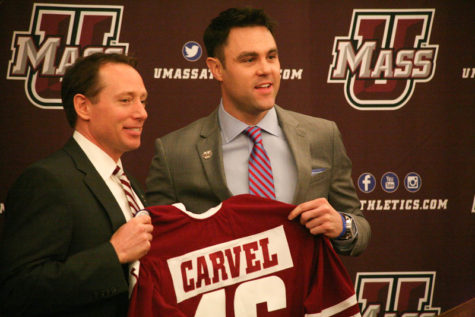
***
The UMass Club in Boston was buzzing with optimism on March 31, 2016.
Athletic director Ryan Bamford gathered media and alumni in the state’s capital to introduce Greg Carvel as the new coach of the UMass hockey team. The program had finished in last or next-to-last place in the four most recent seasons. John Micheletto, the former coach, had just been fired. Getting Carvel – a coach with a legitimate and successful track record – was cause for celebration.
During his first interview with the media, a reporter tossed up a simple question.
“What are your expectations?” Mike McMahon of College Hockey News asked Carvel.
While many new coaches would’ve excitedly boasted about future championships and wins, Carvel didn’t feel that way.
“I’ll tell you the truth,” Carvel said, recalling that day in 2016. “When I took this job, I never ever thought we’d be winning a championship…I didn’t come in here thinking ‘hey, we’re going to win championships here’. I came in here thinking this is how I want to do things, these are the people I want to be surrounded by, these are the standards I’m going to hold, these are the values I’m going to have.”
Those values started with sports psychologist Mark Randall, who Carvel began working with while coaching at St. Lawrence. He’d quickly become one of the most influential people on Carvel’s coaching style.
“When you come from the NHL, you know all the systems and you know hockey,” Carvel said. “But that’s not what wins games, that’s not what builds programs.”
That’s where Randall came in. The sports psychologist taught Carvel how to make big decisions and how to handle players and push them to succeed, but not so far, they fall off. Most importantly, he re-programmed the hockey mind to think in terms of culture.
“There’s so many decisions made every day that if you don’t make the right calls, things can go in the wrong direction and Mark has been critical in helping me take the right steps and educating me and the staff on how we should interact,” Carvel said.
When the dust settled surrounding Carvel’s somewhat out-of-the-blue hiring, his attention turned to two main jobs.
First, it was growing the team within Amherst and the surrounding community.
“I’ll never turn down a request to speak to a group,” Carvel said.
Never was that truer than his first year. Countless times, Carvel ditched the whistle, stick and gloves for a collared shirt and walked into fraternities, rotary clubs and anywhere that would let him speak about the hockey team on campus.
At the beginning of the 2017-18 season, his second behind UMass’ bench, he spoke with athletic director Ryan Bamford and men’s basketball coach Matt McCall at the Amherst Works building to a crowd of five people.
“Everyone kindly listened,” Carvel recalled of the very small event.
He preached his vision and what he believed a successful hockey program would look like in Western Massachusetts. He talked about what he hoped would happen. He did this every time he spoke.
“You have to do it,” Carvel said of speaking at events. “I think it’s important. It’s a way of connecting with the community, it’s a way of connecting with the campus and I recognize it.”
It wasn’t hard for Carvel to find a reason to care about the community. His wife, Daina, is from Amherst. Carvel also pursued a master’s degree at UMass.
He channeled that connection through different avenues. Face-to-face interactions and shaking hands were one. Social media was another. In his first two years, he connected with the “Sons of Liberty” – a group of diehard, UMass hockey fans who promoted the team and attended every game. Then came a big, social media connection with “The Militia” who played a similar role.
“This is kind of like recruiting,” Carvel said of making community connections. “If you think it’s going to make your program better, you put your time and energy and I’ve tried to do that.”
Second, it was growing a team good enough to find a route out of Hockey East’s cellar.
The talent ran thin on the team Carvel inherited, so like growing the message of the team in the community, it wasn’t going to be changed overnight – they weren’t going from to worst to first in a year.
But the culture Carvel, Ben Barr and Jared DeMichiel wanted to set was clear.
“It’s built on integrity and communication, on competing,” DeMichiel said when asked to define the culture they love to talk about. “It’s about just being really honest with yourself. There’s a huge level of honesty within the locker room, within the players from the coaching staff.”
That level of honesty starts before the players even step on campus.
***
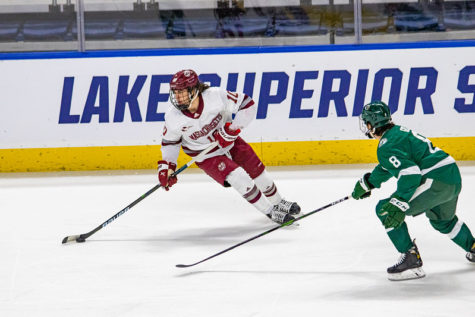
***
Anyone who’s sat in on even one interview with Greg Carvel over the past few years would know that his favorite word is “culture”. Everything, in some way, relates back to it.
So, when the Daily Collegian inquired about the word, he gave a bus analogy to better understand how that culture becomes tangible.
“You’ve got to get the right people on the bus,” Carvel said. “That’s what we’ve been able to do and then once you get the right people on the bus, you make it very clear what the expectations are and the standards.”
In simpler, non-bus terms, he’s talking about recruiting.
When the Carvel administration began, UMass was not a hot, college hockey destination to play in for aspiring collegiate players. The Minutemen were easily outdone by the likes of Boston College, Boston University and Northeastern, and that’s just within the state.
So, Jared DeMichiel and Ben Barr looked outside of New England for players, drawing on their midwestern routes, mulling over the USHL circuit for players who they feel fit the culture of UMass.
“Honestly, we feel like we get the best kids,” DeMichiel said when asked about competing with other Hockey East schools for recruits. “They may not be the highest draft pick or social media might not give them a ton of attention.”
One of those kids was Josh Lopina.
“He didn’t come in with much hoopla and attention and social media didn’t tell him how great a player he was and he’s going to be this, and going to be that,” DeMichiel said of Lopina.
Yet Lopina shined in his rookie campaign. His point total (23), two-way game and faceoff mastery earned him Co-Hockey East Rookie of the Year honors.
“It’s finding kids with the right DNA and finding kids who want to be pushed,” DeMichiel said.
That begins with meeting their parents.
“As basic as it sounds, the apple doesn’t fall far from the tree,” DeMichiel said. “When we have communications with their parents, you can tell pretty fast where the kid is at.”
The other question comes in the coaching staff’s first meeting with the player they’re looking at. It comes from Carvel.
“First question I ask if how do you do in school?” Carvel said. “Kids who do well in school, which for most people is not a lot of fun, if you’re willing to work hard in school, I know you’ll work hard on the ice and work hard in the weight room. You’re probably a disciplined kid, probably got high character.”
It’s no surprise then that Carvel never misses a chance to tout his squad having the highest GPA among all male teams at UMass. That stat has stood since 2019. It creates a culture around the team of constantly wanting to have good grades.
“In a strong culture, you don’t want to be the weak link,” Carvel said. “You see that in the academic part of it. The kid on our team who had the lowest GPA last year came to me and he said that will never happen again. I’m not going to be the lowest GPA on the team and I was like great.”
The player with the lowest GPA last year moved up the GPA ranks this season, according to Carvel.
Past the grades and the parents, every recruiting story of how the coaching duo fell in love with a player, and vice versa, is different. Bobby Trivigno’s experience (re: above) vastly differs from Matt Kessel’s last-second mad dash to Amherst, which vastly differs from Zac Jones only having Union looking at him, which vastly differs from the next guy, which vastly differs from the next guy.
The one constant thread through all of them, however, is their reactions to the brutal honesty from the coaching staff during their first recruitment meeting. That comes after a tour of campus and probably a meal at Blue Wall.
“We kind of explain to them how things are going to be here and how they’re going to be pushed and they’re going to be coached,” DeMichiel said. “This is how it’s going to be. It’s going to make them a better person, it’s going to make them a better player. The kids that don’t blink and they just eat it up and they’re freaking drooling out of their mouths when we say that kind of stuff, they’re the ones that fit in here.
“The kids that maybe have been silver spooned or told their whole life they’re so great, those aren’t really the guys that fit in here.”
John Leonard looked to be on track to be one of “those” kids – one who was “silver spooned”. He was a star at Springfield Cathedral high school. In his final season in Springfield, he put up 75 points in 25 games. It was a great local story for Western Mass.
Then came the USHL and a reality check. In his first season with the Green Bay Gamblers, he totaled nine points in 48 games. The next season saw a bit of a rise – 34 in 58 – but he appeared to have already peaked and struggling outside of the Western Mass. bubble.
He was recruited to UMass by the previous coaching staff. It was the perfect place for a rebound. And Carvel and co. were the perfect crew to boost him back up.
***
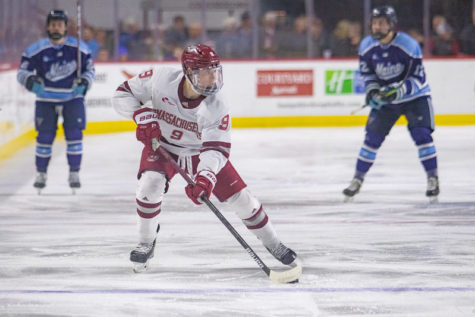
***
John Leonard had six points in the first seven games of 2020. It looked nice on paper. It was not, however, indicative of a complete game.
UMass’ most dangerous forward wasn’t playing up to expectations in his own zone. Aside from the bottom half of the offensive zone, Leonard was missing the mark. His overall stats for the season to that point – 22 points in 25 games – weren’t cutting it either, especially given the expectations he carried.
So, on Jan. 25, 2020 in the second game of a series with UNH, Greg Carvel had seen enough. Leonard watched that game from the seats of the Whittemore Center. UMass tied UNH, 1-1.
“I’m sure people thought we were on crazy pills when we did that,” UMass assistant coach Jared DeMichiel said looking back on the benching.
Leonard’s night off paid instant dividends. He went on a tear, putting up 15 points in the eight remaining games, most notably potting 10 goals in five games, two of which were hat tricks. It was no surprise that after all that production, Leonard had a legitimate case for the Hobey Baker award.
“Maybe he becomes the Hobey Baker award winner if that season doesn’t get shut down because he was absolutely on fire,” Carvel said of the 2019-20 season being cancelled due to the COVID-19 pandemic.
Almost a year after Leonard’s famous benching, UMass was playing Providence on Jan. 23. With just 19 seconds to play in the second period of a 1-1 game, Bobby Trivigno was called for a slash.
Carvel had seen enough. Trivigno was drawing on his old ways of spending too much time in the penalty box. Combine that with a recent decline in play, and Trivigno watched the third period, overtime and shootout from the middle of the bench.
“I deserved to sit on the bench,” Trivigno said at the time. “I was the best teammate I could be on the bench rooting my teammates on. It just goes to show how Carvy is. He’s going to treat everyone the same way. It doesn’t matter if you’re an assistant captain.”
And once again, UMass reaped the benefits of a top-tier player being benched.
Over the course of the final 12 games, including the Hockey East playoffs and NCAA tournament, Trivigno put up six goals and 16 points. Those efforts earned him Hockey East tournament MVP and Frozen Four Most Outstanding Player.
Leonard and Trivigno play very different games but provided similar impacts to UMass. Both were tabbed with being offensive forces for the Minutemen who had glaring weaknesses in their respective games as underclassmen.
For Leonard, it was his defensive game. For Trivigno, it was breaking the on-ice rules too many times.
The instance of Trivigno crossing the line had a pretty obvious peak – when he was suspended for the national title game in 2019 after he elbowed a Denver player in the head.
“I told him this year: ‘I’m not dealing with that. You stay out of the box. You need to grow in that area.’ He had very few penalties this year,” Carvel said of his preseason conversation with Trivigno. “Being able to emotionally control yourself is a huge growth area for me.”
Leonard didn’t have any big, obvious moment that sparked a need for change. But as Leonard’s stock grew and the NHL looked more and more like a landing spot for the Amherst, Mass native, Carvel and the coaching staff noted to him that if he was to have success at that next level, his defensive effort would need to be a whole lot better.
“We had some conversations with him that at the time, I’m sure he didn’t like,” DeMichiel said of meeting with Leonard about his defensive play. “But now, looking back on it, he loves every second of it and I think he really knows that we had his best interest in mind.”
Over the course of his final season in Amherst, Leonard was a consistent presence on the penalty kill. Gone were the days of not being able to play Leonard in his own zone. He was much more willing to block shots.
So, why does this matter? Because of that one word.
Culture.
“I think a lot of times a lot of people, especially coaches, there is always some sort of favoring of players in some variation,” Carson Gicewicz, a fifth-year transfer from St. Lawrence, said. “You really don’t see that here.”
Never was that clearer than when Carvel benched his leading goal scorer. A year later, it was his top offensive threat and assistant captain.
Both instances, as well as numerous others, sent a clear message down the lineup: There was a standard set. Keep up with it or else.
***
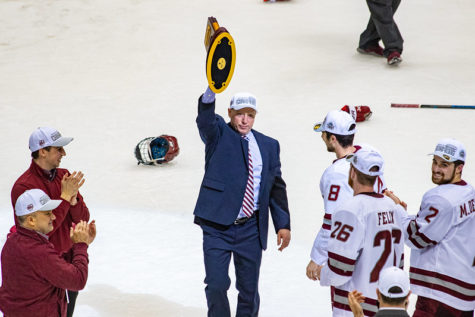
***
Greg Carvel sat down to speak with the media almost an hour after climbing to the top of the college hockey mountain. His squad had just beat St. Cloud State, 5-0, in the 2021 national title game. Life was good in Amherst.
He took questions for a while and successfully fought back tears, as well as a coughing fit. No matter the question, all of his answers seemed to go back to culture.
At one point, he was asked about that vision he had in 2016 when he took the job.
He rifled through every aspect of the organization – the assistant coaches, the sports psychologist, the equipment managers, the trainers, hockey operations – to show their impact on that vision.
When he got to the players, however, he mentioned something interesting.
“To think that Cale Makar, Mario Ferraro, John Leonard and Mitchell Chaffee were supposed to be on this team,” he said.
That’s right – the four most talented, all-around players UMass has had under Carvel technically could’ve been on the winning team. When Makar and Ferraro left right after the national championship loss in 2019, people wondered how UMass would ever get back to the Frozen Four without their wonder boys on defense. The next offseason it was Leonard and Chaffee departing for the NHL. Once again, people wondered how UMass would ever get back to the Frozen Four without their offensive powerhouses.
Yet here the Minutemen were in their second consecutive Frozen Four. The only difference was this time, they emerged as champions.
“It’s people and culture,” Carvel said. “That’s why we were able to turn the program around.”
Evan Marinofsky can be reached at [email protected]. He can be followed on Twitter @emarinofsky.
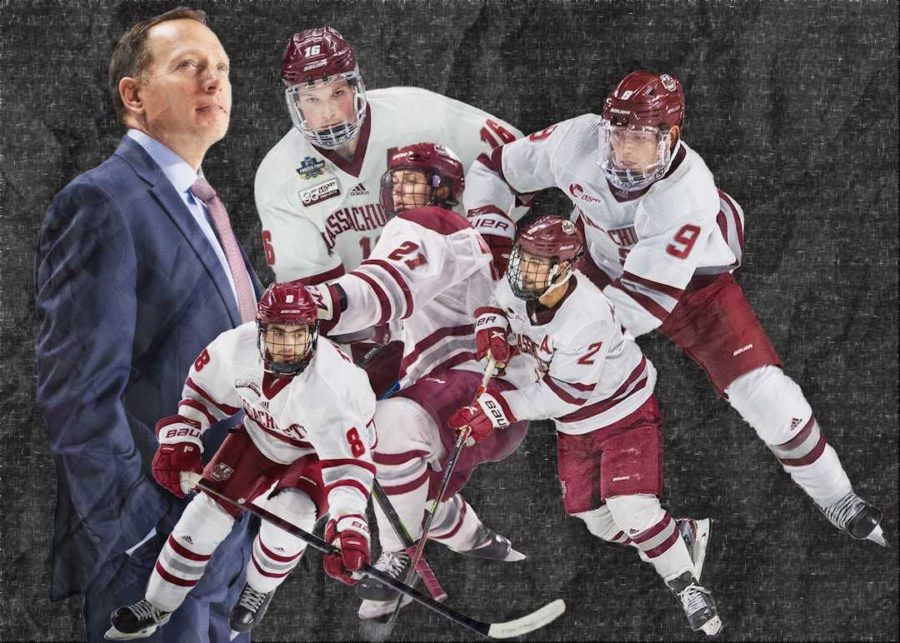
Richard Misci • May 16, 2021 at 12:12 am
As an Alumnus and fan I could not be prouder! I’m a season ticket holder, and can’t wait for the first game when the championship banner is raised!
JOSEPH P SHURKUS • May 15, 2021 at 3:20 pm
A wonderful story about a miracle team. As a UMass alum from the class of 1977, I remember the pre- Hockey East days when the team would play at Orr Rink at Amherst College (they made it over there in pick up trucks!) and a huge upset of UNH on one winter evening…I loved my 4 years in Amherst and have followed the various UMass athletic teams, ever since…I had always harbored a distinct hollow feeling, however, as a D-1 National Championship always eluded my beloved Minutemen & Minutewomen…until Coach Carvel and the National Champions of 2021!!
It sounds corny, and absolutely is corny, but I feel that (while I have no interest or plans to die soon), I feel that I can literally die a happy man, because of the achievements of the wonderful young men of the UMass Hockey Team!
STEPHEN UNGBERG • May 14, 2021 at 5:26 pm
U Mass has one hell of a coach. I am a SLU grad and was very surprized and dejected when Greg got hired away by UMASS. I now understand why it happened . SLU a small division 3 school in North Country of NYS, but with a very proud DIV 1 hockey tradition can no way compete with the money and resources of a state school. Obviously the SLU administration was asleep at the wheel. Everyone knows the depths that SLU Hockey fell to after Greg’s departure…..I now have 2 favorite teams to follow in college hockey GO UMASS and GO SLU!!!!!
Dave McPhee • May 13, 2021 at 2:15 pm
It all started with the genius of Ryan Banford.
UMass sports are coming together now thanks to Ryan.
Women’s and men’s Basketball, and many other athletic sporting events are something to be proud of.
Watch as UMass football becomes a team of success.
Thank you Ryan Bamford.
67 grad